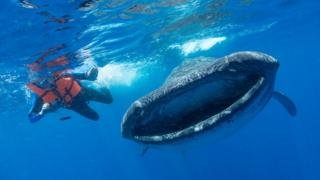 Scientists say there needs to be more research into the impact of plastic pollution on sharks, whales and rays.
Scientists say there needs to be more research into the impact of plastic pollution on sharks, whales and rays.
A study, in the journal Trends in Ecology and Evolution, says the creatures may be swallowing hundreds of tiny bits of plastic a day.
Microplastic pollution has the potential to further reduce the population sizes of the large filter feeders, they say.
Yet, there is very little research being carried out into the risks.
Researchers from the US, Australia and Italy looked at data on threats to large filter feeders from microplastics. These small plastic pieces less than five millimetres long can be harmful to the ocean and aquatic life.
The Gulf of Mexico, the Mediterranean Sea, the Bay of Bengal and the Coral Triangle are priorities for monitoring, according to a review of studies.
Manta ray with plastic in IndonesiaImage copyrightELITZA GERMANOV/MARINE MEGAFAUNA FOUNDATION
Image caption
Manta ray with plastic in Indonesia
"The full magnitude of risks of ingesting microplastics are yet to be fully investigated," said Elitza Germanov of Murdoch University, Australia, and researcher at the US Marine Megafauna Foundation.
Possible risks include reduced nutritional uptake and damage to the digestive system when microplastics are ingested, she said.
In addition, toxin exposure through plastic ingestion could affect many biological processes, such as growth and reproduction, putting filter feeding populations "under even more strain", she added.
Flagship species
The study argues that large filter feeders, many of which are "charismatic and economically important species", should be prioritised for further research into risks from microplastics.
Filter feeders swallow hundreds of cubic metres of water a day to capture their food from water, and may take in microplastics during the process.
Microplastics are similar in size and mass to many types of plankton.
Manta rayImage copyrightELITZA GERMANOV/MARINE MEGAFAUNA FOUNDATION
Image caption
Manta ray, a giant of the ocean, swimming amongst plastic
Studies have shown chemicals associated with plastics in the bodies of whale sharks and fin whales.
"Our studies on whale sharks in the Sea of Cortez and on fin whales in the Mediterranean Sea confirmed exposure to toxic chemicals, indicating that these filter feeders are taking up microplastics in their feeding grounds," said co-researcher Prof Maria Fossi of the University of Siena in Italy.
"Exposure to these plastic-associated toxins pose a major threat to the health of these animals since it can alter the hormones, which regulate the body's growth and development, metabolism, and reproductive functions, among other things."
Seven charts that explain the plastic pollution problem
Whale sharks feeding in the Sea of Cortez off Mexico's Baja Peninsula, which is an important breeding ground, are estimated to ingest under 200 pieces of plastic per day.
Fin whales in the Mediterranean Sea are thought to be swallowing closer to 2,000 microplastic particles per day.
Hi! I am a robot. I just upvoted you! I found similar content that readers might be interested in:
http://www.bbc.co.uk/news/science-environment-42920383